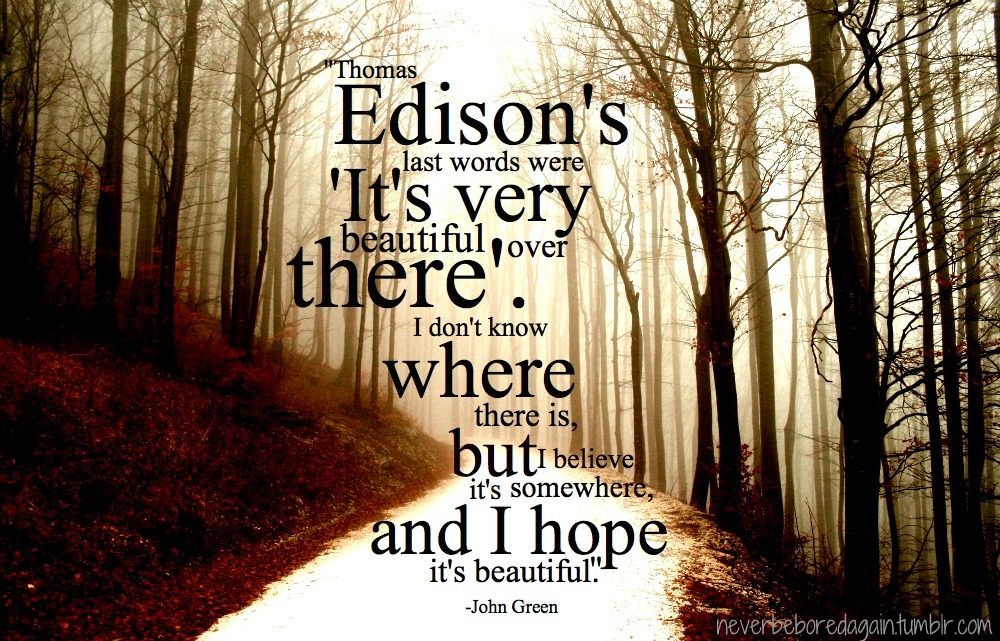 |
| This is not me... I just thought it fit well |
So, when I find a book I really like, I'm trying to get myself into the habit of reading that author's first book as well, if not all of them. I want to see what it was they published first and what kind of acclaim if any they received, how they have progressed as writers from then to now. So after discovering John Green recently (I know, rather late, huh?) I decided that I should read his first book, which also happened to win the Printz Award, "Looking for Alaska".
Now up front, I'm going to tell you that unlike most reviewers of this book, I didn't really like it. Ok, well let's say I have a love/hate relationship with it that throughout my reading usually veered towards the less than positive side. As I said in my review of The Fault in Our Stars (which you can read here) I don't really like contemporary realistic fiction (I'm warming up to it a bit with The Fault in our Stars and Beth Kephart's Small Damages and Undercover but I'm still not completely hooked). Besides the fact that I've always just enjoyed historical fiction, I've never really related well to these teenagers who are supposed to be typical teenagers but not really because of course they are a main character in a book and so they thus defy the norm (does that make any sense? probably not).



I tell you first what I found disappointing in the read. Though I do truly believe that John Green was not trying to elevate the behavior of Miles, the Colonel, Alaska and the rest of their friends, and despite the fact that at least some of their actions had consequences, in the end Green's story worked towards normalizing these actions (ie. drinking, smoking, promiscuity) and creating the sense that in today's world these are all give-ins in the world of the teenager. And even if for many this is the case, I just didn't feel like it wasn't all completely necessary, and in this respect it should be read by mature teenagers or young adults (which to me this term means college students, although for some this category starts at 14...) who aren't completely impressionable, but by this term I don't want to imply that teenagers are just so not there and unintelligent, no if John Green's novels work to prove something, they prove that teenagers are capable of understanding extremely intelligent and even philosophical ideas, not all of them of course, I met many of them who weren't when I was in high school, but many do, and he chooses to make his most important characters those kinds of teenagers. However, even when teenagers are extremely smart they are still able to fall prey to peer pressure or actions they think are acceptable and normal just because they see it everywhere (And yes Miles, or Pudge, I found him to be a total sucker for peer pressure).
In light of these comments though, I can't say that I didn't connect with the characters or that I didn't find them believable, I just didn't relate to them on a personal level, ie I wouldn't really want to be friends with them. However they were extremely interesting individuals, because essentially they are all dysfunctional and rebellious BUT at their core John Green has ignited in each of them such a powerful light of honesty and for lack of a better word intellectualism that there were things I couldn't help liking about them: Pudge/Miles and his obsession with great last words, the Colonel and his brilliant knack for memorizing every capital of the world and just being really smart, and yes even Alaska and her amazing "life's library" was thoroughly impressive and enviable.
And really, the most powerful ones came following the chapter entitled, "fifty-one days after" to the end of the book, which are the last 26 pages. So yes if I would have given up and not kept going I would have missed some great moments.
These last 26 pages where fueled by the last lecture they have with Dr. Hyde, their World Religions teacher. Dr. Hyde is a character that made the book better for me, I actually related more to him which is probably strange since I'm an 20 something undergrad and he's an very old prep school teacher close to making his way out of this "labyrinth" we call life. Here's a taste of Dr. Hyde's lecture:
"'Everything that comes together falls apart'" the Old Man said. "Everything. The chair I'm sitting on. It was built, and so it will fall apart. I'm gonna fall apart, probably before this chair. And you're gonna fall apart. The cells and organs and systems that make you you--they came together, grew together, and so must fall apart. The Buddha knew one thing science didn't prove for millennia after his death: Entropy increases. Things fall apart." (196)
So there, that's what I have to say about "Looking for Alaska". I'm not sure as of yet exactly who or what age group I would recommend this too, but I do admit that it wasn't a waste of time and those last 26 pages made the labyrinth of what was "Looking for Alaska" really bearable.
And I'll leave you with the last last words of the book:
("Thomas Edison's last words were:
'It's very beautiful over there.'
I don't know where there is, but I believe it's somewhere,
and I hope it's beautiful." )



No comments:
Post a Comment